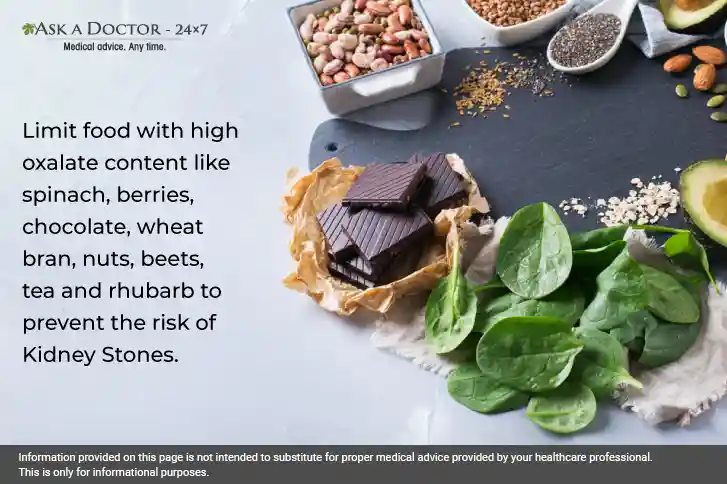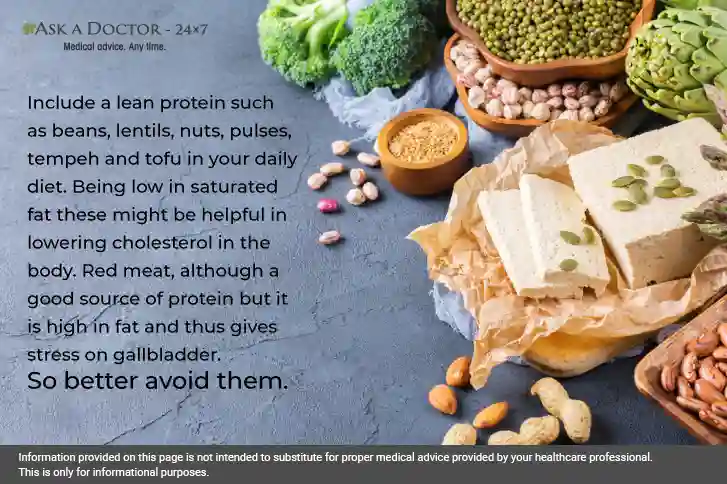Diet Recommendations For People With Kidney And Gallbladder Stone
In situations where someone is experiencing severe abdominal pain, it might be a sign of kidney or gallbladder stones. Certain foods can help lighten the pain during this time and provide additional health benefits.
What is Kidney Stone?
If there is a pain in the stomach or one side of your back that comes and goes suddenly, this might be a symptom of a kidney stone. Kidney stones are small pebble-like pieces that form in one or both kidneys. When a persons have a high level of certain minerals or calcium in their urine it leads to the formation of kidney stones. These stones can be as small as grain of sand, or as large as a pea pod, and sometimes even larger. It is said that small-sized stones may pass out through urine, and larger or odd-shaped stones can get stuck inside the urinary tract and block urine flow.
Identify the Types of Kidney stones
There are different types of kidney stones including:
- Calcium Oxalate
- Calcium Phosphate Stones
- Struvite Stones
- Uric Acid Stones
- Cystine Stones
What are the Prime Causes of Kidney Stones?
- Not drinking enough water
- Obesity
- Weigh loss surgery
- Eating food with too much salt or sugar
- Infection and family history
- Pregnancy
- Vitamin C Supplements
- Too much or too little exercise
Recognize the Common Symptoms
- Severe Pain on either side of lower back
- Unbearable pain in the stomach that does not go away
- Blood In Urine
- Fever and Chills
- Urine that smell bad or look cloudy
What are Diet Recommendations for People With Kidney Stones?

If you or any of your known are diagnosed with kidney stones, make sure to follow these diet recommendations:
- Drink plenty of fluids, 8-12 glass of water. Any type of fluid, such as water and lemonade, has been shown to have beneficial effects, except for grapefruit juice and soda. This will help produce less concentrated urine and ensure a good volume of at least 2.5 liter/day
- Limit food with high oxalate content like spinach, berries, chocolate, wheat bran, nuts, beets, tea, and rhubarb to prevent the risk of Kidney Stones.
- Eat enough dietary calcium by consuming low-fat dairy products. This will help lower the risk of calcium stone formation
- Avoid extra calcium supplements and they should be individualized by health care professional
- Eat a moderate amount of protein. Limit consumption of beef, pork, eggs, fish, and cheese. High protein intake will cause the kidney to excrete more calcium, therefore this may cause more stones to form in the kidney.
- Avoid high salt intake. High sodium intake increases calcium in the urine, increasing the chance of developing a stone.
What are Gallbladder Stones?
Gallstones, also called cholelithiasis, are formed when bile sediments collect and crystallize, often due to an excess of one of the main ingredients in bile. These hardened pieces of bile form in the gallbladder or bile ducts. Gallstones can become more dangerous if they start to travel through the biliary tract and get stuck, causing a blockage and resulting in pain. A gall bladder stone is common in women and people assigned female at birth. The pain of gallstone is quick and severe. This is called gallstone attack or gallbladder attack. It is most severe after eating. When the gallbladder contracts, it creates more pressure on the biliary system.
Identify the Type of Gallstones
Below are the type of gallbladder stones:
- Cholesterol Stone
- Pigment Stone
What are the Common Causes and Risk Factor Associated With Gallstones?
Here are a few common causes of gallbladder stones:
- Elderly aged people especially after 40 years of age
- Overweight or obesity
- Unhealthy or high-fat diet
- Family History
- Diabetics
- Birth control pills
- Rapid weight loss
- Bariatric surgery
- Woman or assigned female at birth
Recognize the Symptoms of Gallbladder Stones
Gallstones generally don’t cause symptoms unless they are stuck and create a blockage. This blockage causes symptoms of upper abdominal pain and Nausea.
- Nausea or Vomiting
- Upset Stomach
- Pain in the upper right side of the belly
- Pain in the right shoulder, lower chest, or back
- Indigestion, heartburn, or digestive problems
What are the Diet Recommendations For People with Gallbladder Stones?

Following are the diet recommendations specialists give to those diagnosed with GB stones:
- Eat a lean protein such as beans, lentils, nuts, pulses, tempeh, and tofu in your daily diet. Being low in saturated fat might help lower cholesterol in the body. Red meat, although a good source of protein is high in fat. This is why it is said to put stress on the gallbladder. Perhaps, choosing a lean protein source might help to manage the symptoms of gallbladder stones.
- Consume lean meat, sardines fish or eggs, or plant-based sources of proteins such as beans, lentils, nuts, pulses, tempeh. Tofu and low-fat milk and milk products can also be eaten.
- Fruits and vegetables like beans, citric fruits, dark leafy green vegetables, bell peppers, and tomatoes contain vitamins, minerals, fiber and antioxidants that can help to maintain a healthy gallbladder. Vitamin C, magnesium, and folic in particular may promote good gall bladder health.
- Include a diet rich in fiber supports digestive systems and helps the movement of food through the bowel. It also keeps the gall bladder healthy. Food rich in fiber fruits, vegetables, beans, pulses, and wholegrain. Healthy fats include unsaturated fat that comes from plant source rather than animal fat such as Avocado, nuts and seeds, olive, rape seed, and sunflower oil.
- Avoid saturated fat and trans fat as they can put more strain on gall bladder. Try to avoid food like whole milk, meat, butter, ghee, cheese, cakes, deep-fried food, and processed food. Eat small and frequent meals to spread out the amount of fat and avoid large fatty meals.
Conclusion
To prevent the accumulation of stones, prefer eating a balanced diet that is low in sodium, oxalate-rich foods, and animal proteins, along with sufficient water intake and including calcium-rich foods. Remember, eating the right diet and avoiding foods high in fat will help improve and protect your gallbladder health.
For any queries related to your kidney health, you can Ask a Nephrologist online at Ask a Doctor 24x7.
Recently Answered Questions Related to Kidney and GB Health
- I Am Breastfeeding And Detected With Kidney Stone. Will It Be Safe To Take Medicine?
- What Causes Kidney Stones?
- What Does The Presence Of Blood In Urine Indicate?
- Can Kidney Stones Cause Pain?
- Could Kidney Stones Cause Dark Brown Urine?
- How Can Kidney Stones And Blood Urea Be Controlled?
- Diet Chat For Kidney Stones
- What Causes Continued Pain After Gallbladder Is Removed?
- How To Remove Gallstones Without Surgery?
- What Causes Inflammation In The Gallbladder?
Disclaimer: Information provided on this page is not intended to substitute for proper medical advice provided by your healthcare professional. This is only for informational purposes.
Ask a Specialist
Recent Questions


